Toward Failure: Why A FloCombat Writer Needs To Fight Again
Toward Failure: Why A FloCombat Writer Needs To Fight Again
FloCombat writer Elias Cepeda chronicles his return to competition at FightToWin Pro 33.
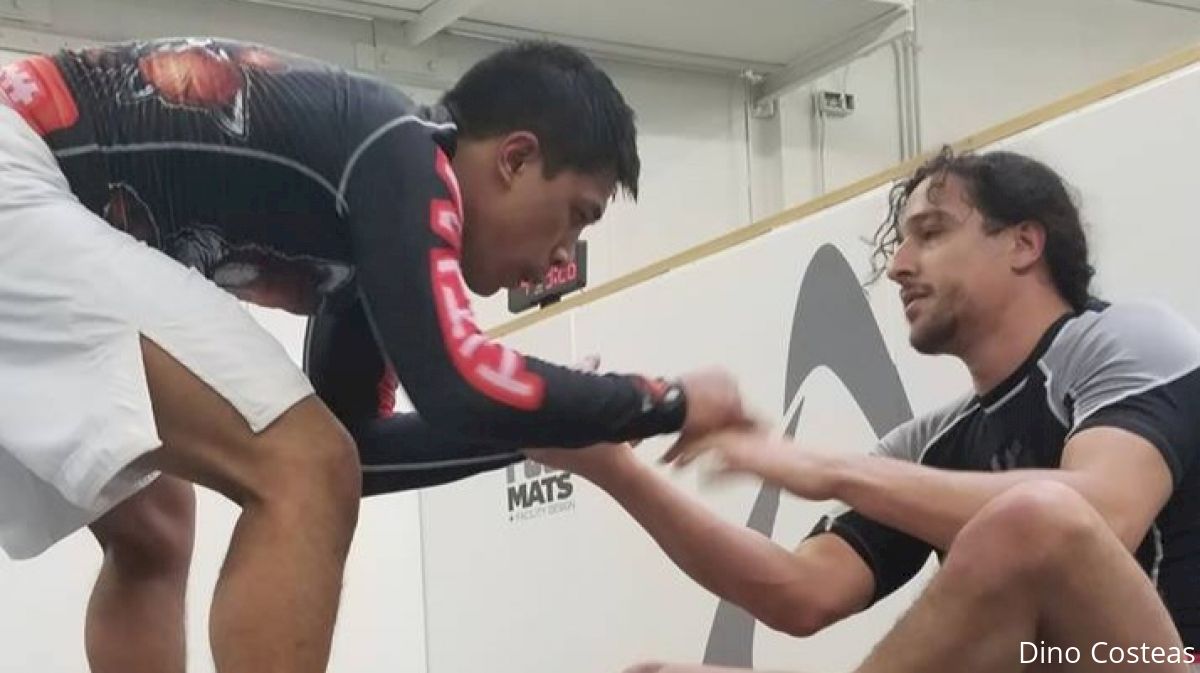
By Elias Cepeda
In weight training, I'm told, there is a concept of working until muscle failure with repetitions within sets of exercises. I guess the idea is that sometimes you've got to go until you can't go anymore, until you're stopped, in order to experience real growth.
That's a somewhat micro-level example, but when we take a step back and look at larger pictures we can find other times when working until failure can also have benefits.
I write a lot, train a bit, and fight whenever I can. Due to disc injuries, I haven't been able to do as much fighting as I would have liked recently.
I began training in Brazilian jiu-jitsu back in 1999 as a 15-year-old with my cousin Gerardo at Dino Costeas' academy in Chicago. Since taking my first MMA fight in 2010, I've focused my training on fighting, not on grappling competitions.
I never grappled at a high level prior to that, and I'm not a high-level MMA fighter now. But mindfulness in a certain direction has an impact on development, and the bulk of my learning has come within a fighting paradigm. I've had some modestly good results for my efforts.
I'm proud of my own wins, prouder of my students', and happy with how I've rebounded from my losses. I haven't been healthy enough to fight in MMA for a few years, but I've been recovering nicely in the past year.
There's been MMA sparring, again, more hard days of work, and I've gotten into half-presentable shape. It's been a blast.
The plan is to fight again, soon. Before I do that, however, I've just signed up for two submission grappling matches, in which no strikes are allowed but takedowns, slams, chokes, joint locks, and more are permitted.
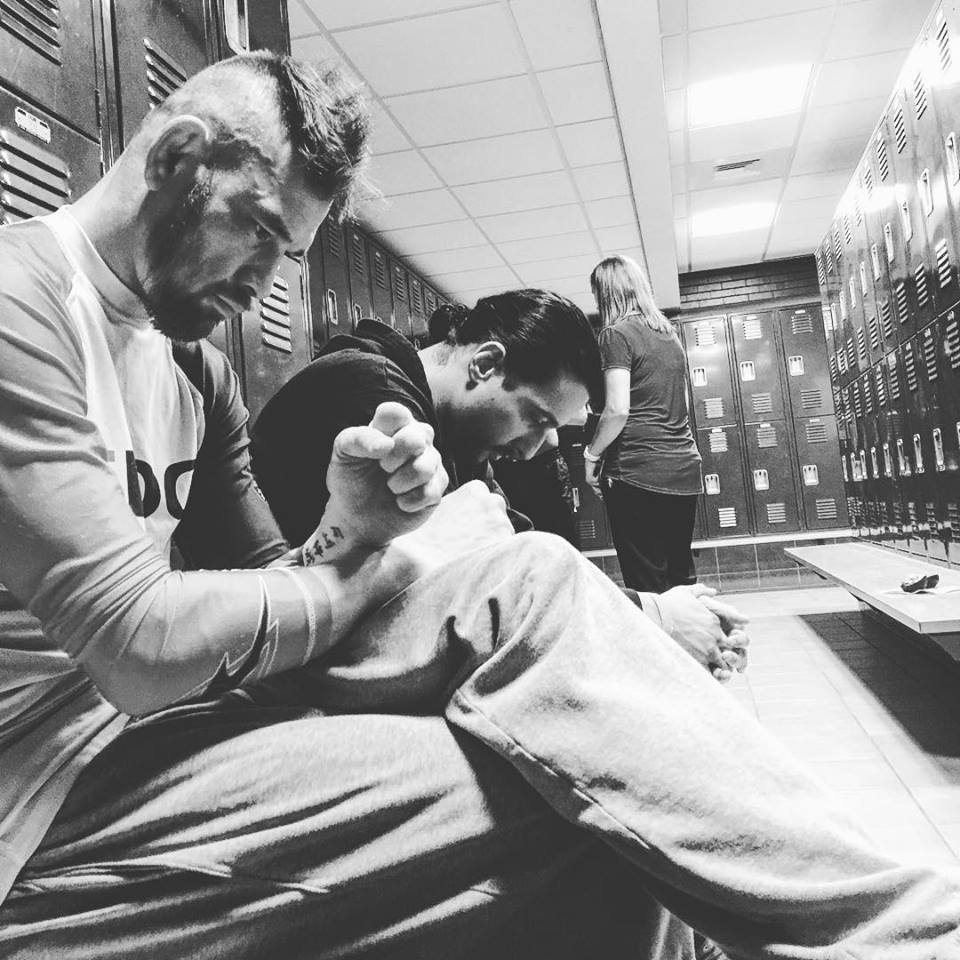
Photo Credit: Dino Costeas
First up is FightToWin Pro 33, a submission-only event taking place near Chicago on April 29 and being broadcasted live on FloGrappling. The next match is scheduled for May 13 at XFO Pro III.
I surprised my coaches by taking these matches so suddenly. Frankly, I think I alarmed some of them.
After all, I'm going to a competition type that isn't my style and where I haven't focused my energies. I just recently came off of new minor injuries, and my personal and professional life right now means that my schedule isn't optimal for training at this very moment.
Beyond all that, both of my opponents, Miguel Gamez Jr. and Joseph Hooker, are top-notch, experienced champion submission grapplers with higher ranks in Brazilian jiu-jitsu than myself. If I'm objective, taking all things into consideration, I'm a huge underdog in both of these matches.
To be blunt, odds are that I will lose, maybe even quickly.
The question as of yet unspoken may then be, am I setting myself up for failure with these two submission grappling matches?
Exactly.
Sort of…
Losses are psychologically tough to deal with in combat sports. The mind understands that, especially in the case of stoppages, it was only the referee stepping in that saved you from death at the hands of another man or woman who bested you in a primal struggle.
The point is, losing in a combat sport is especially dispiriting given the stakes and what the matches represent. With that being said, I have lost enough to know how I respond to losses -- with a burning drive to get the taste of defeat out of my mouth.
As it so happens, the last time I competed was in an MMA fight that I won. So, the last thing I did was win.
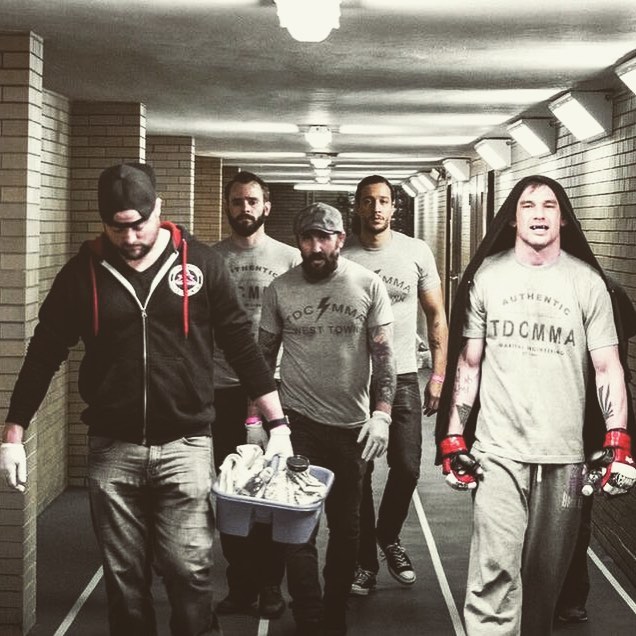
Photo Credit: Logan Velez
If lose one or both of these upcoming submission grappling matches, I know that I'll at least be left with that helpful agitation that comes from losses, driving me to right the ship by working harder, improving, and trying again.
I also know how I react to victories -- I want more of them. As bad as losing a combat sport competition is, winning one is just as intensely great.
Euphoric.
So, I'm confident that my mentality will be right after these upcoming matches in just about any scenario I can think of, win or lose. Mostly, I'm doing these matches to go through nerves and butterflies, again.
Those unaccustomed to being punched, kicked, flipped, and choked may find this hard to believe, but I've found that the waiting, with all its winding, soaring, and diving emotional swerves is by far the most stressful aspect of fighting. These two submission grappling matches I've got coming up won't have the threats of punches and kicks, but because they are single matches, watched by large crowds, complete with walk-outs, cameras, competitors' names announced on loudspeakers, and all the rest, it will probably mean that they'll feel a lot like fights up until the match and so will be good practice for my adrenal glands before I fight in MMA, once again.
Really, the only reason not to take these submission grappling matches when they were offered to me would have been to protect my ego from public losses in tough matchups a little bit outside of my element. If a martial artist can't win a battle against his or her ego, however, they're unlikely to ever win anything of importance in life.
My mind goes back to a conversation I had with UFC lightweight Joe Lauzon back in 2015 as he headed into a submission grappling match -- out of his element -- against top grappler Dillon Danis. If Joe was afraid of losing face and competing on someone else's terms, if he was more concerned with winning and losing rather than finding out what he could experience and learn, he hid it well.
"I'm definitely in deep water," he admitted.
"Grappling and fighting are different things. They are similar, but they're different. So, I'd be a fool to think it will be easy for me to go into his world of grappling without strikes. It's going to be a challenge."
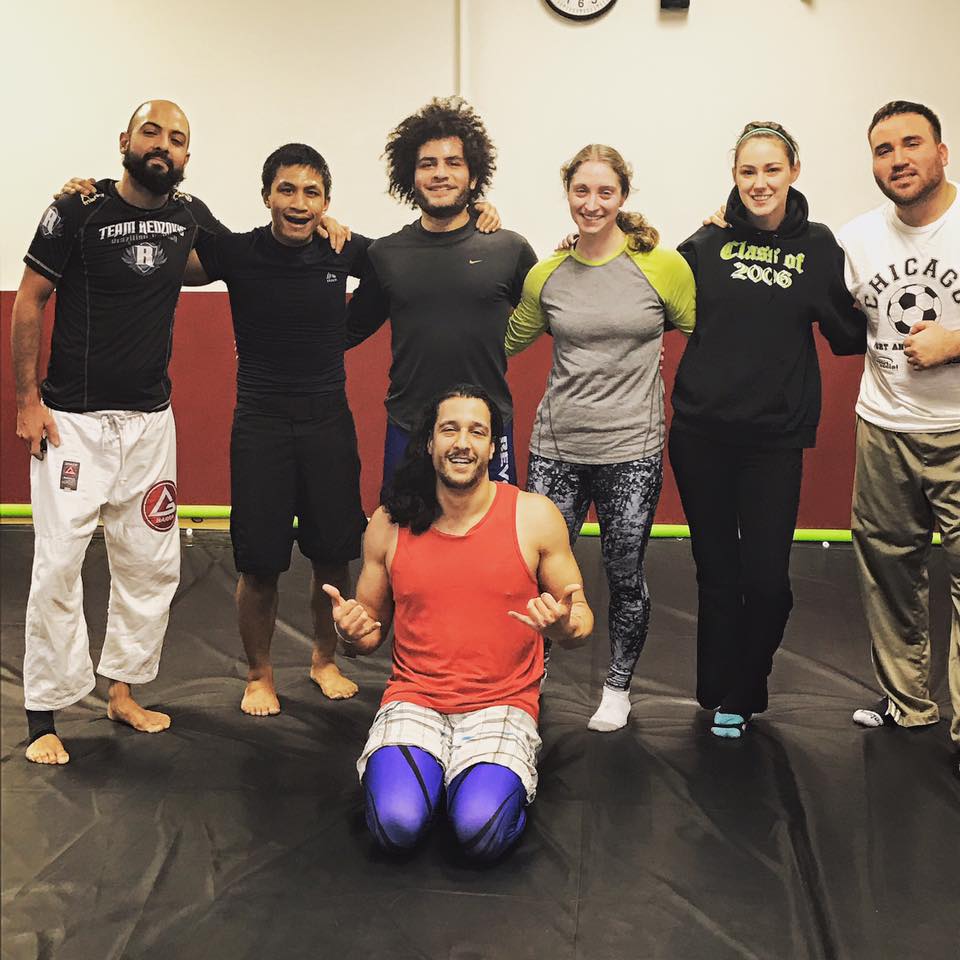
Joe tested himself, had fun, learned, and moved on with his fighting life. It's that type of spirit that I admire most in a competitor.
My preparation can't be perfect for these matches. I'm sure it won't be for my opponents, either.
Perfect preparation doesn't exist. Optimal preparation may be possible, and though I'm trying hard to do so, I'm probably not going to get it ahead of these two matches.
That's all right.
I've twice accepted MMA fights since my last actual bout, only to get injured early in training camp and have to pull out. That isn't something I like to do.
I've fought on days' notice before and fought with a partially torn ACL. Showing up is an important part of my identity.
It's just that 18 going on 19 years of training and competing are taking their toll on my body such that it's honestly hard to know if I'll ever be able to complete six to eight weeks of a full, brutal training camp, again. So, if my body won't hold up long enough any longer to get optimal, tailored training, the choice seems to be between giving up competition forever or instead giving up on perfectionism and even conceptions of optimum preparation being necessary prerequisites for competition.
That's a tough, delicate call to make in combat sports, even at my very low level. Lacking preparation can get you hurt, so skimping on it is done at one's own risk.
I've also been taught to have high standards for training. In many ways, I've managed to elevate them in these recent years that I've battled injuries and been kept out of fighting.
I'm more disciplined, smart, and consistent, even if I also go all-out far less often. High training standards are important.
If your standards keep you on the sidelines, however, they may not actually be working to your advantage. In those cases, they may be excuses to protect you from hits to your ego, to keep your psyche safe.
When my father, Roberto, signed me up for Brazilian jiu-jitsu back when I was in high school to learn some self-defense, I don't think that's the type of safety he wanted for his son. He wanted for me the safety of technical knowledge, reflexes, and the ability to act in spite of fear that all come only from stepping into the fire to test oneself.
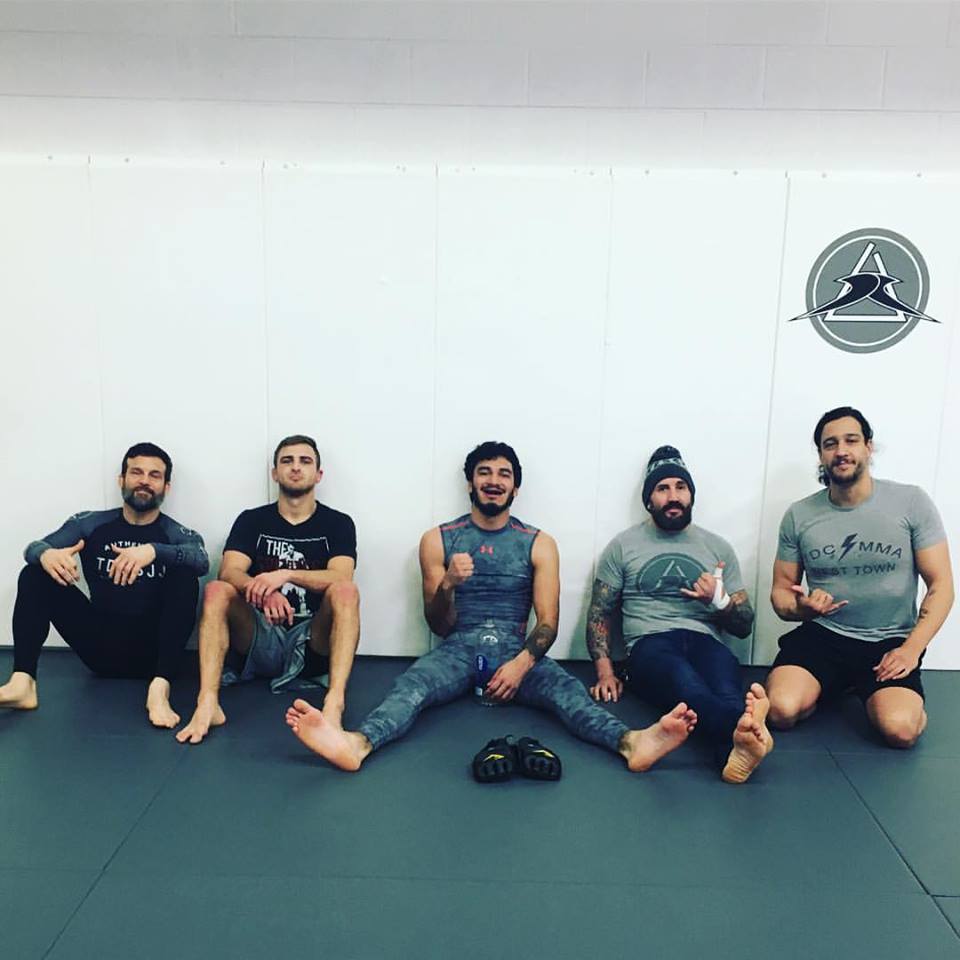
My body may not agree with me, but I'm still on that journey. I'm very competitive, and I know once I lock up with anyone, I'll do anything I can to win.
In fact, there's only one sporting thing I enjoy more than winning a fight or combat sports match, and that's simply being in a fight. I believe that the second you love winning a fight more than you love simply being in a fight, you become a more cautious, less brave version of yourself.
I want to fight again, and these matches may help me back into the training patterns and mindsets I'll need to do so. So, I'll show up.
I'll scrap, and whatever happens will happen. When the dust settles and the wounds heal, I'll go out and do it again.
I may never be a world champion in anything (and that stinks for the 12-year-old me's ego that thought I'd at least have one or two NBA Finals rings by now) but that's OK. I can still love martial arts.
I can still love competition. I can still love the fight, and I can go chase as many fights as is possible until the wheels fall off.
We all can.
I'm hoping I'll be able to live with that. I bet I can.
In weight training, I'm told, there is a concept of working until muscle failure with repetitions within sets of exercises. I guess the idea is that sometimes you've got to go until you can't go anymore, until you're stopped, in order to experience real growth.
That's a somewhat micro-level example, but when we take a step back and look at larger pictures we can find other times when working until failure can also have benefits.
I write a lot, train a bit, and fight whenever I can. Due to disc injuries, I haven't been able to do as much fighting as I would have liked recently.
I began training in Brazilian jiu-jitsu back in 1999 as a 15-year-old with my cousin Gerardo at Dino Costeas' academy in Chicago. Since taking my first MMA fight in 2010, I've focused my training on fighting, not on grappling competitions.
I never grappled at a high level prior to that, and I'm not a high-level MMA fighter now. But mindfulness in a certain direction has an impact on development, and the bulk of my learning has come within a fighting paradigm. I've had some modestly good results for my efforts.
I'm proud of my own wins, prouder of my students', and happy with how I've rebounded from my losses. I haven't been healthy enough to fight in MMA for a few years, but I've been recovering nicely in the past year.
There's been MMA sparring, again, more hard days of work, and I've gotten into half-presentable shape. It's been a blast.
The plan is to fight again, soon. Before I do that, however, I've just signed up for two submission grappling matches, in which no strikes are allowed but takedowns, slams, chokes, joint locks, and more are permitted.

Photo Credit: Dino Costeas
First up is FightToWin Pro 33, a submission-only event taking place near Chicago on April 29 and being broadcasted live on FloGrappling. The next match is scheduled for May 13 at XFO Pro III.
I surprised my coaches by taking these matches so suddenly. Frankly, I think I alarmed some of them.
After all, I'm going to a competition type that isn't my style and where I haven't focused my energies. I just recently came off of new minor injuries, and my personal and professional life right now means that my schedule isn't optimal for training at this very moment.
Beyond all that, both of my opponents, Miguel Gamez Jr. and Joseph Hooker, are top-notch, experienced champion submission grapplers with higher ranks in Brazilian jiu-jitsu than myself. If I'm objective, taking all things into consideration, I'm a huge underdog in both of these matches.
To be blunt, odds are that I will lose, maybe even quickly.
The question as of yet unspoken may then be, am I setting myself up for failure with these two submission grappling matches?
Exactly.
Sort of…
Losses are psychologically tough to deal with in combat sports. The mind understands that, especially in the case of stoppages, it was only the referee stepping in that saved you from death at the hands of another man or woman who bested you in a primal struggle.
The point is, losing in a combat sport is especially dispiriting given the stakes and what the matches represent. With that being said, I have lost enough to know how I respond to losses -- with a burning drive to get the taste of defeat out of my mouth.
As it so happens, the last time I competed was in an MMA fight that I won. So, the last thing I did was win.

Photo Credit: Logan Velez
If lose one or both of these upcoming submission grappling matches, I know that I'll at least be left with that helpful agitation that comes from losses, driving me to right the ship by working harder, improving, and trying again.
I also know how I react to victories -- I want more of them. As bad as losing a combat sport competition is, winning one is just as intensely great.
Euphoric.
So, I'm confident that my mentality will be right after these upcoming matches in just about any scenario I can think of, win or lose. Mostly, I'm doing these matches to go through nerves and butterflies, again.
Those unaccustomed to being punched, kicked, flipped, and choked may find this hard to believe, but I've found that the waiting, with all its winding, soaring, and diving emotional swerves is by far the most stressful aspect of fighting. These two submission grappling matches I've got coming up won't have the threats of punches and kicks, but because they are single matches, watched by large crowds, complete with walk-outs, cameras, competitors' names announced on loudspeakers, and all the rest, it will probably mean that they'll feel a lot like fights up until the match and so will be good practice for my adrenal glands before I fight in MMA, once again.
Really, the only reason not to take these submission grappling matches when they were offered to me would have been to protect my ego from public losses in tough matchups a little bit outside of my element. If a martial artist can't win a battle against his or her ego, however, they're unlikely to ever win anything of importance in life.
My mind goes back to a conversation I had with UFC lightweight Joe Lauzon back in 2015 as he headed into a submission grappling match -- out of his element -- against top grappler Dillon Danis. If Joe was afraid of losing face and competing on someone else's terms, if he was more concerned with winning and losing rather than finding out what he could experience and learn, he hid it well.
"I'm definitely in deep water," he admitted.
"Grappling and fighting are different things. They are similar, but they're different. So, I'd be a fool to think it will be easy for me to go into his world of grappling without strikes. It's going to be a challenge."

Joe tested himself, had fun, learned, and moved on with his fighting life. It's that type of spirit that I admire most in a competitor.
My preparation can't be perfect for these matches. I'm sure it won't be for my opponents, either.
Perfect preparation doesn't exist. Optimal preparation may be possible, and though I'm trying hard to do so, I'm probably not going to get it ahead of these two matches.
That's all right.
I've twice accepted MMA fights since my last actual bout, only to get injured early in training camp and have to pull out. That isn't something I like to do.
I've fought on days' notice before and fought with a partially torn ACL. Showing up is an important part of my identity.
It's just that 18 going on 19 years of training and competing are taking their toll on my body such that it's honestly hard to know if I'll ever be able to complete six to eight weeks of a full, brutal training camp, again. So, if my body won't hold up long enough any longer to get optimal, tailored training, the choice seems to be between giving up competition forever or instead giving up on perfectionism and even conceptions of optimum preparation being necessary prerequisites for competition.
That's a tough, delicate call to make in combat sports, even at my very low level. Lacking preparation can get you hurt, so skimping on it is done at one's own risk.
I've also been taught to have high standards for training. In many ways, I've managed to elevate them in these recent years that I've battled injuries and been kept out of fighting.
I'm more disciplined, smart, and consistent, even if I also go all-out far less often. High training standards are important.
If your standards keep you on the sidelines, however, they may not actually be working to your advantage. In those cases, they may be excuses to protect you from hits to your ego, to keep your psyche safe.
When my father, Roberto, signed me up for Brazilian jiu-jitsu back when I was in high school to learn some self-defense, I don't think that's the type of safety he wanted for his son. He wanted for me the safety of technical knowledge, reflexes, and the ability to act in spite of fear that all come only from stepping into the fire to test oneself.

My body may not agree with me, but I'm still on that journey. I'm very competitive, and I know once I lock up with anyone, I'll do anything I can to win.
In fact, there's only one sporting thing I enjoy more than winning a fight or combat sports match, and that's simply being in a fight. I believe that the second you love winning a fight more than you love simply being in a fight, you become a more cautious, less brave version of yourself.
I want to fight again, and these matches may help me back into the training patterns and mindsets I'll need to do so. So, I'll show up.
I'll scrap, and whatever happens will happen. When the dust settles and the wounds heal, I'll go out and do it again.
I may never be a world champion in anything (and that stinks for the 12-year-old me's ego that thought I'd at least have one or two NBA Finals rings by now) but that's OK. I can still love martial arts.
I can still love competition. I can still love the fight, and I can go chase as many fights as is possible until the wheels fall off.
We all can.
I'm hoping I'll be able to live with that. I bet I can.